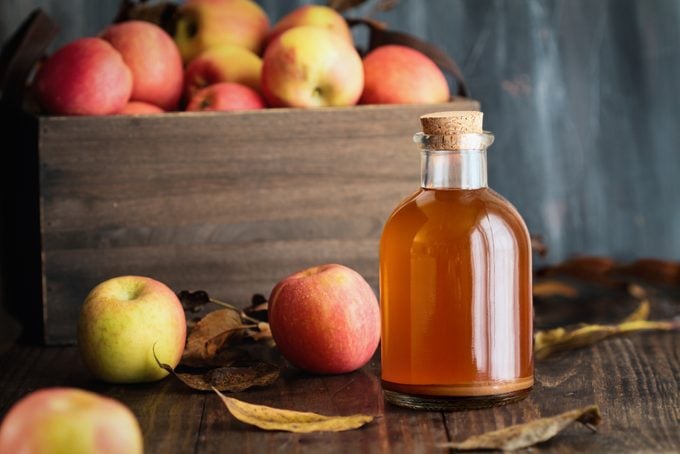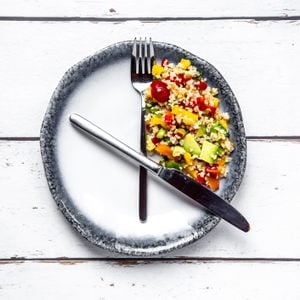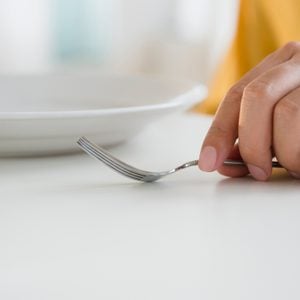Can You Drink Apple Cider Vinegar While Fasting?
Updated: Oct. 29, 2020
Intermittent fasting is all about what you eat and drink. Here's what dietitians are saying about drinking apple cider vinegar while fasting.
What is intermittent fasting?
Intermittent fasting—a period of time during which you refrain from consuming calories—is arguably the fastest-growing diet plan. With these various types of intermittent fasts, you consume calories during a specific window of time and usually consume only water and other non-calorie beverages during the fasting portion. Does that include apple cider vinegar? It depends on the intent of your fast.
These are some of the most popular types of intermittent fasting:
-
Time-Restricted Eating: Among the easiest approaches to follow, according to the dietitians we spoke to, this involves consuming your calories within a specific window of time (usually an eight-hour window). This is sometimes called the 16/8 method.
-
The Warrior Diet: A much stricter plan that entails spending the majority of your day fasting or under-eating and then consuming calories during a four-hour window at night.
-
The 24-Hour Fast: Also known as the Eat-Stop-Eat plan, this approach requires a 24-hour fast once or twice a week. You then eat as desired for the other five or six days of the week.
-
Twice-a-Week or 5:2 Fast: With this approach, you choose two days each week to consume 500 calories, then eat as desired for the other five days of the week.
-
Alternate-Day Fasting: Eat 500 calories every other day, then eat as desired on alternating days.

Can you drink apple cider vinegar while fasting?
“If you’re using fasting for religious or specific therapeutic purposes, then any food or drink that is not water will break your fast,” says Autumn Bates, a certified clinical nutritionist in Manhattan Beach, California. “If you’re using fasting to stabilize blood glucose levels, tap into fat-burning mechanisms, and improve insulin sensitivity, though, apple cider vinegar will not break your fast.”
When using intermittent fasting for weight loss, one of the primary goals is to reduce the frequency in which you’re secreting the glucose-storing hormone insulin, Bates explains. While fasting, you won’t be stimulating the release of the hormone because you aren’t eating.
“Most drinks that aren’t water or plain tea or coffee will cause some level of an insulin response and therefore would break a fast,” she says. But acids like lemon juice and vinegar (in small amounts) have such low levels of sugars, calories, and macronutrients, they shouldn’t trigger the release of insulin.
Apple cider vinegar is essentially apple juice that’s been fermented twice. The sugars in the apple are fermented by yeast and transformed into alcohol. Then bacteria ferments that alcohol into acetic acid.
Apple cider vinegar has long been used for cooking and pickling. But as more research emerges showing its ample health benefits—from reducing sugar cravings to better blood glucose control—it’s bubbled up as a dieter’s aid.
Here’s a breakdown on the nutrition of apple cider vinegar per tablespoon, according to the USDA’s FoodData Central nutrition database:
-
5 calories
-
0 grams of fat
-
0 grams of protein
-
1 grams of carbs
-
1 grams of sugar
Potential benefits and risks of drinking apple cider vinegar while fasting
This pantry staple is low in calories and offers some health wins, but more isn’t necessarily better. The fermentation process takes apple cider and revamps it into vinegar that is a strong acid. That prolonged contact with anything this acidic can damage the enamel of your teeth, according to the American Dental Association.
Try adding it to a glass of water in a 1:10 ratio (one tablespoon apple cider vinegar per 10 tablespoons, or about five ounces, of water) for ample dilution. Stick with one to two tablespoons per day max to score the research-backed health benefits of apple cider vinegar while fasting—and to keep your teeth safe. Throughout the rest of the day, hydrate with plenty of plain water to promote digestion and satiety.
Counting calories while fasting
Many intermittent fasting methods allow days of eating whatever amount of calories your body craves. On fasting days or during fasting windows, the calorie range is typically between 0 and 500 calories. (This is equal to 3 ounces of grilled chicken, 1½ cups of sliced strawberries, a ¾ cup carrot sticks, and 2 tablespoons nut butter.)
It’s up to you how you allocate the calories and if you do so with food or drink.
What the science says about fasting
“The science is pretty solid showing that intermittent fasting is a good approach to helping people lose and maintain weight loss,” says Julie Upton, RD, co-founder of the nutrition news company Appetite for Health in San Francisco.
A review of studies, published in 2017 Annual Reviews, crunched the numbers and compared results from dozens of fasting-related studies, and found that:
-
Fasting for eight to 12 hours prior to a blood draw may have a positive impact on insulin and blood sugar levels.
-
Intermittent fasting seems to be successful at reducing the risk of several chronic diseases like type 2 diabetes and cardiovascular disease.
-
Alternate-day fasting can lead to extreme hunger, so time-restricted eating may be a better intermittent fast for many in terms of sustainability.
-
In 16 studies related to weight, 11 found statistically significant weight loss results from intermittent fasting.
Fasting has been linked to potential muscle loss, however, if fasters don’t prioritize eating quality foods in their eating windows or if they restrict calories too drastically, according to a study published in 2020 in JAMA Internal Medicine.
Anyone who is pregnant or lactating, has diabetes, a history of an eating disorder, or is taking any medications that must be taken with food should avoid intermittent fasting.
The takeaway
Drinking apple cider vinegar during your fast is okay as long as you’re not fasting for religious or therapeutic purposes. To add it to your diet, remember less is more. Applying a 1:10 ratio of apple cider vinegar with a glass of water will help ensure you reap its touted health benefits and stay safe.




